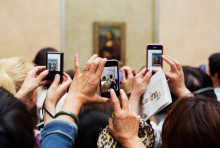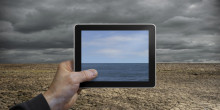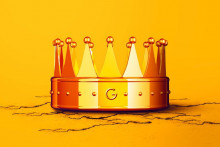
Many writers look for “insider information” on not only how to write but also how to market what they write.
I’m always looking for both, and that’s what intrigued me about a recent interview with literary critic Parul Sehgal. Here is part of what she shared:
I love being part of both a tradition of literature and this fantastic, fractious, quarrelsome thing known as criticism, which is part of literature, and on top of it, and alongside it.
Criticism can be a way of adding to a bank of knowledge, a bank of understanding, a way of refreshing and renewing and protecting language.
In scientific fields, there’s this established idea that you’re always standing on the shoulders of giants — that every discovery pushes the whole enterprise forward. When it comes to the arts, though, we don’t talk about things that way. We tend not to say that, because of some novel, we now know X or Y. But I’ve always felt that to be true. Because of the modernists, for example, we have a greater sense of subjectivity.
I like to think of literature and criticism as an act of pushing something forward, of mapping new terrains, internal and external, of doing things with language that reveal something about what it means to read and to live.
Want more? You can read the full article here

Full disclosure: I’m a huge fan of David Brooks. So, when I see his op-ed each week, I feel like I’ve received a gift.
Recently, he penned a piece, “When Politics Becomes Your Idol.” It spoke to me and I think it will speak to you. Here is part of what he said:
What you see is good people desperately trying to connect in an America where bonds are attenuated — without stable families, tight communities, stable careers, ethnic roots or an enveloping moral culture. There’s just a whirl of changing stepfathers, changing homes, changing phone distractions, changing pop-culture references, financial stress and chronic drinking, which make it harder to sink down roots into something, or to even have a spiritual narrative that gives meaning to life.
Today, partisanship for many people is not about which party has the better policies, as it was, say, in the days of Eisenhower and Kennedy. It’s not even about which party has the better philosophy, as it was in the Reagan era. These days, partisanship is often totalistic. People often use partisan identity to fill the void left when their other attachments wither away — religious, ethnic, communal and familial.
Want more? You can read the full article here

Most of us would agree that technology has enriched our lives in countless ways. But as it has, we have begun to become wary of the ways it may have less-than-positive effects.
Here is how a recent piece in the New York Times tried to get at the heart of just what it is that is making us uneasy about technology:
Technology has crossed over to the dark side. It’s coming for you; it’s coming for us all, and we may not survive its advance. So why am I feeling so bad about tech?
Well, who isn’t, right? Look around you. It’s difficult to get jazzed about smartphones and social networks when smartphones and social networks might be ruining the world. The technologies we were most excited about 10 years ago are now implicated in just about every catastrophe of the day. (See how Russian propagandists used Facebook and Twitter to inject false narratives into the news media last year.)
More immediately, there’s the threat of ever-growing corporate control over much of what we do. These companies are not evil; they’re all led and staffed by smart, well-meaning people who believe that technology can radically improve the world. But as I argue in the series, we have not, as a society, come to grips with the scope of their control over our lives. And we don’t have many good ways to limit it, if we decided that’s what we’d like to do.
Want more? You can read the full article here

It was bound to happen sooner or later – and later is now! Literature has met big data. Are we ready for it?
I’d always “suspected” something was afoot, but it hit me like a two-by-four when I read a recent New York Times article: “Reading by the Numbers: When Big Data Meets Literature.” Here is part of what this intriguing article offered:
Most literary criticism is grounded in close reading, with scholars poring over individual texts to tease out subtle meanings. But to truly grasp the laws of literature, Mr. Moretti has argued in a series of polemics, requires “distant reading”: the computer-assisted crunching of thousands of texts at a time.
It’s a pie-in-the-sky idea, perhaps, but one that Mr. Moretti has put into practice. Since 2010, Stanford Literary Lab, which he founded with Matthew Jockers, has issued a string of pamphlets chronicling its research into topics ranging from loudness in the 19th-century novel to the evolving language of World Bank reports.
Want more? You can read the full article here

Some people believe that a solitary journey toward contentment is what will really make them happy. Sadly, it a self-help truism that isn’t really true.
I thought I understood that…at least intuitively…but it really hit home for me when I read a piece, “Happiness is Other People. Here is part of what this recent op-ed had to offer:
In an individualistic culture powered by self-actualization, the idea that happiness should be engineered from the inside out, rather than the outside in, is slowly taking on the status of a default truism. This is happiness framed as journey of self-discovery, rather than the natural byproduct of engaging with the world; a happiness that stresses emotional independence rather than interdependence; one based on the idea that meaningful contentment can be found only by a full exploration of the self, a deep dive into our innermost souls and the intricacies and tripwires of our own personalities. Step 1: Find Yourself. Step 2: Be Yourself.
Self-reflection, introspection and some degree of solitude are important parts of a psychologically healthy life. But somewhere along the line we seem to have gotten the balance wrong. Because far from confirming our insistence that “happiness comes from within,” a wide body of research tells us almost the exact opposite.
Academic happiness studies are full of anomalies and contradictions, often revealing more about the agendas and values of those conducting them than the realities of human emotion. But if there is one point on which virtually every piece of research into the nature and causes of human happiness agrees, it is this: our happiness depends on other people.
Want more? You can read the full article here

If you read only one article this week, read, “The Phone Is Smart, but Where’s the Big Idea?” Here’s just a taste:
I used a smartphone GPS to find my way through the cobblestoned maze of Geneva’s Old Town, in search of a handmade machine that changed the world more than any other invention. Near a 13th-century cathedral in this Swiss city on the shores of a lovely lake, I found what I was looking for: a Gutenberg printing press.
“This was the Internet of its day — at least as influential as the iPhone,” said Gabriel de Montmollin, the director of the Museum of the Reformation, toying with the replica of Johann Gutenberg’s great invention. It used to take four monks, laboring in a scriptorium with quills over calfskin, up to a year to produce a single book.
With the advance in movable type in 15th-century Europe, one press could crank out 3,000 pages a day. Before long, average people could travel to places that used to be unknown to them — with maps! Medical information passed more freely and quickly, diminishing the sway of quacks. And you could find your own way to God, or a way out of believing in God, with access to formerly forbidden thoughts.
The printing press offered the prospect that tyrants would never be able to kill a book or suppress an idea. Gutenberg’s brainchild broke the monopoly that clerics had on scripture. And later, stirred by pamphlets from a version of that same press, the American colonies rose up against a king and gave birth to a nation.
Intrigued? You can read the entire article here

Last week, I posted a blog built around my thoughts on a 2011 New York Times article entitled, “Novelists Predict Future With Eerie Accuracy.”
More recently, I read an interesting piece that called out specific events or technologies, from the atomic bomb, to digital media, to Watson, to more. Here is how the piece begins:
The late Tom Clancy was known for his uncanny ability to accurately predict future events with his fiction writing. His 1994 novel, “Debt of Honor,” describes a September 11th-like attack, and his 2010 book “Dead or Alive” describes the capture of a Bin Laden-like public enemy.
While remarkable, these seeming premonitions aren’t uncommon; Sci-fi writers have been predicting the future for centuries. Jules Verne was describing rocket ships and submarines before these vehicles of exploration even existed. Although we don’t delve into the ocean’s depths inside of “a long object, spindle-shaped, occasionally phosphorescent, and infinitely larger and more rapid in its movements than a whale,” his prediction, while distorted, more or less came true.
This presents a “chicken or the egg?” sort of question: Do writers simply notice the direction a cultural phenomenon is heading in, or do their ideas inspire cultural and technological change? In some cases, a fiction writer’s imagination serves as a sort of catalyst for new technologies. But sometimes, like with Edward Belamy’s lost classic “Looking Backwards,” it’s difficult to say whether or not the author had anything to do with the eventual inventions.
Want more? You can read the full article here.

Every so often, I find an article that speaks volumes about how we live our lives and sometimes suggests a course correction.
That’s why I was taken by Erick Erickson’s revealing piece, “How to Find Common Ground.” He admits it took a near-death experience to inspire him to write this article. Here is part of what he shared:
“As we have moved more of our lives onto the internet, we have stopped living in actual communities. Instead we have created virtual communities where everyone thinks the same. We do not have to worry about the homeless man under the bridge because he is no longer part of our community. He is someone else’s problem. But that simply is not true.”
“Even as the internet provides us great advances, it also segments us. We have social-media tribes and our self-esteem is based on likes and retweets. We have hundreds of television channels and even more video choices online where Hollywood no longer has to worry about broad appeal. There is a channel for everyone, and everyone in the tribe will get the inside jokes. Social-media interactions have replaced the value of character.”
“The truth, though, is that our Facebook friends are probably not going to water our flowers while we are on vacation and our Twitter followers will not bring us a meal if we are sick. But the actual human being next door might do both if we meet him.”
“This is what I want my children to know if I should die before they wake. The kitchen table is the most important tool they have to reshape their community. Preparing a home-cooked meal and inviting people over, both those we know and those we want to know, forces us to find common ground.”
Want more? You can read the full article here

Most would agree that technology has enriched our lives and we marvel at the genius of those leading the “FAANG” companies, which most of us know is is an acronym for the five most popular and best performing tech stocks in the market, namely Facebook, Apple, Amazon, Netflix, and Alphabet’s Google.
But increasingly, more voices are being raised expressing strong doubts as to whether this largely romantic view of the tech industry is at odds with reality. That’s why I was struck by New York Times Op-Ed, “Google Doesn’t Care What’s Best for Us.” Here is part of what the writer shared:
“For much of the short life of Silicon Valley, America has held a largely romantic view of the tech industry. Men like Steve Jobs and Bill Gates were held in high esteem. But increasingly, companies like Google, Amazon and Facebook are coming under the same cultural microscope that questioned the “greed is good” culture of the 1980s. Viewers of the comedy series “Silicon Valley” note that uber-libertarianism and uber-geek machismo go hand in hand. And certainly Mark Zuckerberg was not happy with his portrayal in David Fincher’s “The Social Network,” nor could anyone in the Valley be happy with Dave Eggers’s novel “The Circle” or Don DeLillo’s “Zero K.”
“The future implications of a couple of companies’ having such deep influence on our attention and our behavior are only beginning to be felt. The rise of artificial intelligence combined with Google’s omnipresence in our lives is an issue that is not well understood by politicians or regulators.”
“America is slowly waking up both culturally and politically to the takeover of our economy by a few tech monopolies. We know we are being driven by men like Peter Thiel and Jeff Bezos toward a future that will be better for them. We are not sure that it will be better for us.”
“Somehow the citizens of the world have been left out of this discussion of our future. Because tools like Google and Facebook have become so essential and because we have almost no choice in whether to use them, we need to consider the role they play in our lives. By giving networks like Google and Facebook control of the present, we cede our freedom to choose our future.”
Want more? You can read the full article here

I tend to keep a few “gems,” articles that inspire me, make me think, and just stir things up. One of them is one I read and reread, simply because it does what it promises to do.
The New York Times Sunday Review piece, “Novelists Predict Future With Eerie Accuracy,” appeared earlier this decade, but each time I read, I’m staggered by how prescient it is.
Here is part of what writer John Schwartz shares:
“The dirty little secret of speculative fiction is that it’s hard to go wrong predicting that things will get worse. But while avoiding the nihilism of novels like Cormac McCarthy’s “The Road,” in which a father and son wander a hopeless post-apocalyptic moonscape, a number of recent books foresee futures that seem more than plausible as the nation’s ambient level of weirdness rises.”
“In “Ready Player One,” the novelist Ernest Cline extrapolates from the ripples that rising energy prices and climate change send through the economy, and gives us a future where the suburbs die off and many people are packed into in high-rise urban trailer parks, spending their days on an increasingly addictive Internet instead of facing the quotidian squalor. Readers who spend so much time issuing updates via Twitter, Facebook and Google+ that they have forgotten what their spouses look like might see themselves reflected in Mr. Cline’s funhouse mirror. “I did try to envision it as a possible future,” Mr. Cline said. I don’t see it as a future we’re necessarily headed for.”
Want more? You can read the full article here.










